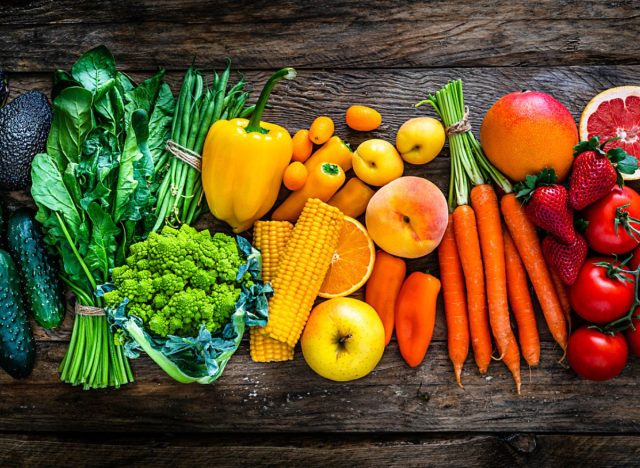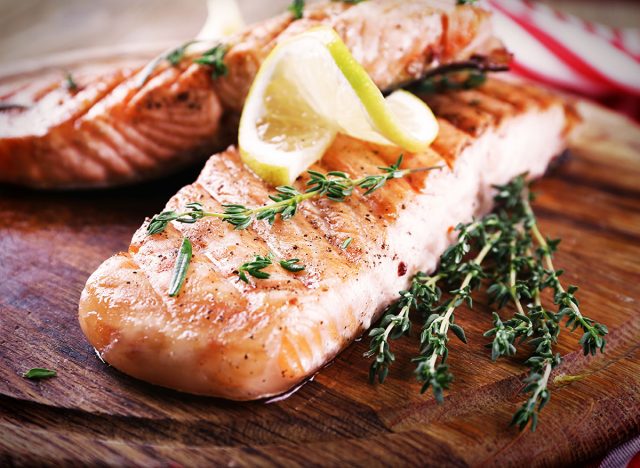The 10 Worst Eating Habits for Inflammation

Whether chronic, acute, or both, virtually everyone has experienced inflammation. In simple terms, you can think of it as the body’s response to an injury or bacterial infection—pain, redness, swelling, heat, and so on. On the one hand, inflammation is an essential part of your body’s defense mechanism. When you experience an acute injury or bacterial illness, your immune system sends inflammatory cells to the affected area as a way to begin healing. But if your body begins to consistently send out these signals when you don’t have an injury or infection, it may be a sign of what is known as chronic inflammation. Chronic inflammation, which can last months or even years, is directly linked to health issues like diabetes and cardiovascular disease.
Many factors can lead to chronic inflammation, like stress, smoking, existing illness, heavy alcohol consumption, and poor diet. But when it comes to your diet, what exactly are the eating habits that can lead to greater inflammation? To answer that question, we reviewed the existing research and spoke with Lauren Manaker, MS, RDN.
Read on to learn about 10 of the worst eating habits for inflammation, and for more healthy eating tips, check out 9 ‘Healthy’ Foods With More Sugar Than You Think.
Make better eating choices every day by signing up for our newsletter!
You’re eating too much added sugar.

According to Manaker, eating a lot of sugar-loaded foods can lead to increased inflammation.
“Added sugars, particularly those found in processed foods and beverages, have been strongly linked to inflammation, and these sugars can increase levels of inflammatory messengers called cytokines,” she says.
A report published in Frontiers in Immunology also emphasizes that diets high in processed sugar can contribute to inflammatory diseases like rheumatoid arthritis, inflammatory bowel disease, psoriasis, and multiple sclerosis.
You aren’t consuming enough produce.

If you’re experiencing excess inflammation, it may be a sign that you need to incorporate more fruits and vegetables into your diet.
“The incorporation of fruits and vegetables into one’s diet is a powerful strategy to combat inflammation because these food groups are rich in antioxidants and anti-inflammatory compounds that can significantly reduce inflammatory markers in the body,” says Manaker. “If you aren’t eating enough produce consistently, you may be missing out on anti-inflammatory benefits.”
Research confirms this. A report published in The American Journal of Clinical Nutrition says that along with reducing inflammatory markers, eating more produce can improve your immunity cells.
You’re not eating enough seafood.

“Seafood, particularly fatty fish like salmon, mackerel, sardines, and trout, is highly beneficial in an anti-inflammatory diet,” says Manaker. “These types of fish are rich in omega-3 fatty acids, specifically EPA and DHA, which have been established to have powerful anti-inflammatory properties.”
Manaker adds, “For generally healthy people, the most recent Dietary Guidelines for Americans recommends eating at least 8 ounces of seafood a week.”
Another important thing to note is that eating fish or seafood that is fried may have the reverse effect, and make inflammation worse, so it’s best to stick to grilled or baked.
You’re eating too much fast food.

Fast food is normally heavily fried and processed, which is why Manaker suggests limiting your consumption when you’re focused on lowering inflammation.
“A study published in the journal Cell suggests that a diet heavy in fast-food-type choices triggers an inflammatory response and can even cause damage to your immune system,” says Manaker.
For a more anti-inflammatory meal, Manaker says, “It may be a better choice to pack your own lunch instead of downing a supersized meal.”
You are consuming more processed meat than fresh meat.

“Processed meats—think bacon, sausage, and lunchmeats—contain advanced glycation end products (AGEs), a component that may cause inflammation in the body,” says Manaker.
She adds that “AGEs are formed when reducing sugars react with proteins under high heat, and these compounds can make food taste great, but may not be great for our overall health.”
Processed meats are convenient choices when you’re looking for quick, affordable options that taste good and last longer than regular meat, but it’s best to limit your consumption if you’re trying to avoid increased inflammation. Or, you can avoid the meat product entirely and opt for fish or vegetarian proteins like tofu or tempeh.
You’ve been using a lot of artificial sweeteners.

This one can be a bit confusing because too much added sugar can lead to more inflammation, but at the same time, sugar alternatives like artificial sweeteners have also been linked to inflammatory responses.
“In a study published in Nature, results show that consuming artificial sweeteners can change the composition of the bacteria found in the gut,” says Manaker. “Specifically, the amount of ‘good bacteria’ that help release anti-inflammatory compounds can be reduced.”
Manaker also adds, “If you must have some sweetness, try some 100% pure maple syrup from Canada. This syrup contains a unique compound called quebecol that has an anti-inflammatory effect on the body.”
You’re still cooking with margarine.

If you’re still cooking with margarine, you may want to reconsider. Many types of margarine contain trans fats, which are known to cause systemic inflammation. And although you can now find some in stores without trans fats, it’s important to read the labels to be sure.
A study from The American Journal of Clinical Nutrition found that trans fats have a strong connection to inflammation in both premenopausal and postmenopausal women. This study found that although there was an increased risk factor for women with higher BMI, the inflammatory effects of trans fats still applied to all levels of BMI.
You’re eating white bread.

Regularly eating highly processed carbohydrates like white bread can also lead to a number of unwanted health issues. According to a study found in Mediators of Inflammation, processed carbohydrates and refined sugar can increase our risk of systemic inflammation.
This is because when we eat carbs with higher amounts of added sugar, it quickly raises the blood sugar levels in our bodies. As our bodies work to process these sugars, it responds with inflammation.
You’re eating late at night.

Sometimes it’s not just about what you’re eating, but when. If you’re having a lot of late dinners or snacking before bed, you may experience increased inflammation.
A study published in PLOS One found a relationship between eating larger meals in the evening and increased inflammatory levels. It was also discovered that our levels of CRP (a natural biomarker of inflammation and other chronic illnesses) increase with the number of calories consumed after 5 p.m.
You’re eating too much red meat.

We’ve discussed how there are high levels of Advanced Glycation End Products (AGEs) in processed meats, but unfortunately, these can be found in unprocessed red meat as well.
Consuming too many AGEs has been linked to causing inflammation in the body and one of the food groups with the highest levels of AGEs is red meat. A food’s levels of AGEs are also directly affected by the method of cooking, with things like grilling, broiling, and pan-frying being linked to increased levels of AGEs. Cooking meat, especially red meat, with these methods may have inflammatory effects.
- Source: Nature Reviews Immunology: "Type 2 diabetes as an inflammatory disease"
- Source: Nature Reviews Immunology: "The immune system in atherosclerosis"
- Source: Excessive intake of sugar: An accomplice of inflammation
- Source: Effects of fruit and vegetable consumption on inflammatory biomarkers and immune cell populations
- Source: Food and Nutritioon Research: "Effect of long chain omega-3 polyunsaturated fatty acids on inflammation and metabolic markers in hypertensive and/or diabetic obese adults: a randomized controlled trial"
- Source: Dietary Guidelines for Americans
- Source: Cell: "Western Diet Triggers NLRP3-Dependent Innate Immune Reprogramming"
- Source: Cardiovascular Research: "Advanced glycation end products and vascular inflammation: implications for accelerated atherosclerosis in diabetes"
- Source: Nature: "Artificial sweeteners induce glucose intolerance by altering the gut microbiota"
- Source: Bioorganic & Medicinal Chemistry Letters: "Anti-inflammatory properties of quebecol and its derivatives"
- Source: Science Direct: "Trans fatty acids – Effects on systemic inflammation and endothelial function"
- Source: The American Journal of Clinical Nutrition: "Dietary intake of trans fatty acids and systemic inflammation in women"
- Source: Excessive Refined Carbohydrates and Scarce Micronutrients Intakes Increase Inflammatory Mediators and Insulin Resistance in Prepubertal and Pubertal Obese Children Independently of Obesity
- Source: Stress, Food, and Inflammation: Psychoneuroimmunology and Nutrition at the Cutting Edge
- Source: Frequency and Circadian Timing of Eating May Influence Biomarkers of Inflammation and Insulin Resistance Associated with Breast Cancer Risk
- Source: Role of C-Reactive Protein at Sites of Inflammation and Infection
- Source: Advanced Glycation End Products in Foods and a Practical Guide to Their Reduction in the Diet
- Source: Advanced glycation end products and vascular inflammation: implications for accelerated atherosclerosis in diabetes









